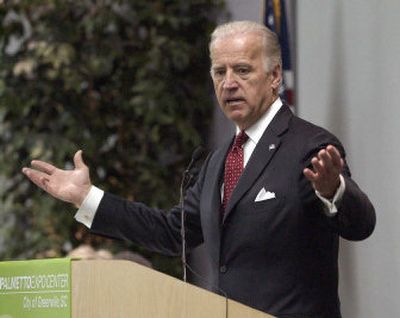Democrats draft limits on Iraq role

WASHINGTON – Senate Democratic leaders intend to unveil a plan next week to repeal the 2002 resolution authorizing the war in Iraq in favor of narrower authority that restricts the military’s role and begins combat troop withdrawals.
House Democrats have pulled back from efforts to link additional funding for the war to strict troop readiness standards after the proposal came under withering fire from Republicans and the party’s own moderates. That strategy was championed by Rep. John Murtha, D-Pa., and endorsed by House Speaker Nancy Pelosi, D-Calif.
In both chambers, Democratic lawmakers are eager to take up binding legislation that would impose clear limits on U.S. involvement in Iraq after nearly four years of war.
But Democrats remain divided over how to proceed. Some want to avoid the funding debate altogether, fearing it invites Republican attacks that the party isn’t supporting the troops. Others take a more aggressive view, believing the most effective way to confront Bush’s war policy is through a $100 billion war spending bill that the president ultimately must sign to keep the war effort on track.
Last week, the House approved a nonbinding resolution that criticized President Bush’s decision to deploy an additional 21,500 troops, but the measure was blocked in the Senate by Republicans during a rare Saturday session. It’s highly possible Senate Democrats will encounter the same procedural roadblock in attempting to push through another resolution – one with real teeth.
“I’ve had enough of nonbinding,” said Sen. John F. Kerry, D-Mass., who is helping to draft the new Democratic proposal. The 2002 war resolution, he said, is an obvious target.
Senate Foreign Relations Chairman Joe Biden, D-Del., began calling for a reauthorization of the war early last month and raised it again last week, during a gathering in Majority Leader Harry Reid’s office.
“We gave the president that power to destroy Iraq’s weapons of mass destruction and, if necessary, to depose Saddam Hussein,” Biden said of the 2002 resolution, in a speech last week before the Brookings Institution. “The WMD was not there. Saddam Hussein is no longer there. The 2002 authorization is no longer relevant to the situation in Iraq.”
Biden and Levin are drafting language to present to their colleagues when the Senate reconvenes Tuesday after a weeklong recess.
The new framework would set a March 31, 2008, goal for withdrawing combat brigades, the same timetable established by the bipartisan Iraq Study Group. Once the combat phase ends, troops would be restricted to assisting Iraqis with training, border security, and counterterrorism activities.
Senior Democratic aides said the proposed resolution would be sent directly to the Senate floor for action, possibly as an amendment to a homeland security bill scheduled for debate next week, without committee review.
Reid, D-Nev., said no final decision had been made on the timing. His spokesman, Jim Manley, said Reid wants to present the idea to other Democrats before determining how and when to proceed.
House Democratic leaders will likely present proposed binding legislation on the war to the Democratic caucus next week, according to lawmakers.